- Meta Materials Circular Markets
- Cercarbono
- end-of-life vehicles
- recycling
- NCDEX e-markets
- MTC Group
- Nitin Chatkaram
- Yashodhan Ramteke
- Alex Saer
Meta Materials Circular Markets Launches Carbon Credit Methodology For Vehicle Recycling
- By MT Bureau
- July 23, 2025
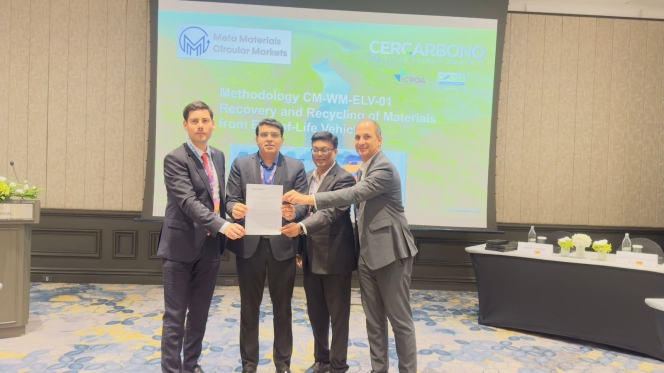
Meta Materials Circular Markets (MMCM) has launched what it claims is the world’s first carbon credit methodology for recycling end-of-life vehicles (ELVs)in partnership with global certification body Cercarbono. The methodology was unveiled during the Asia Climate Summit.
The new framework, titled Recovery and Recycling of Materials from End-of-Life Vehicles, enables carbon credit generation through structured dismantling and recycling of materials such as metals, plastics, and glass. The recycled outputs replace virgin raw materials, reducing emissions and promoting circularity within a certified climate finance structure. The formula was unveiled in association with Cercarbono, a leading global environmental project certification standard during the Asia Climate Summit.
MMCM is a joint venture between NCDEX e-Markets (NeML) and MTC Group. The methodology forms part of Cercarbono’s Carbon Programme and covers eligible materials such as aluminium, steel, copper, plastics (ABS, PET, PP, etc.) and container glass cullet.
Nitin Chitkara, CEO, MMCM, said, “his milestone is deeply personal for all of us at MMCM. What started as a bold idea, rooted in Indian innovation was shaped and strengthened by the many hands and minds who believed in its potential. As we converge efforts towards building circular and low-carbon economies, this is a pivotal moment for us to present Made-In-India as a standardised methodology on a global forum, carrying the spirit of collaboration and shared purpose. Our partners, Cercarbona, played a crucial role in refining every layer of the methodology, making it not just technically sound but globally relevant and ready to implement. With the launch of the ‘Recovery and Recycling of Materials from End-of-Life Vehicles (ELVs),’ we’re introducing a formula that is a practical, proven path to circularity.”
Yashodhan Ramteke, Carbon BU Head at MMCM, said, “The official release of the ELV Carbon Credit Methodology marks a breakthrough for the automotive industry. These credits are not just high-integrity, they come directly from the OEMs’ own end-of-life vehicle value chain. By enabling measurable emission reductions from the recovery, dismantling and recycling of vehicles, this methodology empowers auto companies to take real ownership of their Scope 3 emissions. It’s a practical, circular and scalable climate solution built for the sector – by the sector.”
Alex Saer, CEO of Cercarbono, said “This methodology delivers a concrete response to the growing challenge of vehicle waste. By enabling carbon finance for regulated recycling systems, we not only reduce emissions but also prevent the environmental harm caused by uncontrolled scrapping practices. It’s a climate solution rooted in circularity and equity.”
The methodology applies to Climate Change Mitigation Projects (CCMPs) operating in Registered Vehicle Scrapping Facilities (RVSFs) and supports both greenfield and expansion initiatives. It calculates emissions reductions by comparing recycled material emissions with baseline emissions from virgin production. Only materials transformed into chemically and functionally equivalent substitutes are eligible.
It includes conditions for compliance, traceability, monitoring, exclusion of informal-sector practices, and certification under Cercarbono’s EcoRegistry platform.
ELVs are a rising source of industrial waste, often dismantled in informal scrapyards lacking proper infrastructure, which can lead to pollution from hazardous substances. The new approach provides a regulated, accountable alternative.
- Visteon Corporation
- Mahindra & Mahindra
- Mahindra XUV7X0
- Francis Km
- Adreonx+
- Qualcomm Technologies
- Auto Shanghai 2025
- CES 2026
- Snapdragon
- Uday Dodla
- Mark Granger
Visteon Showcases High-Performance Cockpit Computing, Expands Partnership With Mahindra & Mahindra Too
- By MT Bureau
- January 09, 2026
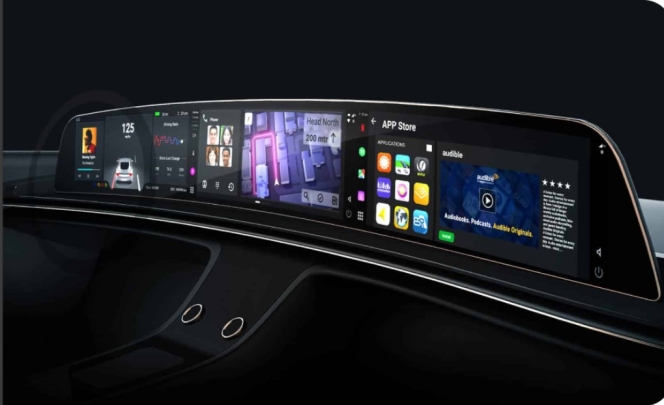
Visteon Corporation has announced an expanded technology partnership with Mahindra & Mahindra that will see its next-generation SmartCore Pro cockpit domain controller deployed in Mahindra’s XUV7X0 SUV lineup.
Unveiled at CES 2026, the SmartCore Pro builds on the SmartCore system introduced in the Mahindra XUV700 in 2021. The new system integrates cockpit electronics, surround view camera technology and telematics on Mahindra’s Adrenox+ platform. It features a three-display configuration supporting vehicle information, infotainment, ADAS visualisation and connectivity, alongside an integrated 360-degree camera system.
Francis Kim, Vice-President of Global Sales & Commercial Excellence and General Manager for Rest of Asia, Visteon, said, “The automotive industry is shifting from discrete systems to fully integrated digital platforms, and India is among the fastest-moving markets in this transition. This partnership demonstrates how strategic OEM collaboration can accelerate time-to-market for complex technologies while laying the foundation for software-defined vehicles.”
Alongside the Mahindra announcement, Visteon also showcased the production specifications and OEM implementations of its High-Performance Compute solution built on the Snapdragon Cockpit Elite platform. The solution follows Visteon’s collaboration with Qualcomm Technologies announced at Auto Shanghai 2025 and is now being demonstrated with multiple global OEMs.
The High-Performance Compute platform supports centralised vehicle architectures and software-defined vehicle strategies. It enables on-device AI processing, multi-display support, multi-user experiences and personalised cockpit features. The system uses the Qualcomm Oryon CPU, Qualcomm Adreno GPU and enhanced NPU AI performance, while Visteon’s cognitoAI Concierge digital assistant operates using the company’s QWEN 7B model.
Uday Dodla, Vice-President, Product Management, Visteon, said, “This High-Performance Compute solution addresses a critical challenge our OEM partners face as they transition to centralized architectures. By consolidating multiple ECUs into a single, powerful platform, we're enabling automakers to reduce complexity and costs while delivering the sophisticated AI-driven experiences that consumers increasingly expect.”
Mark Granger, VP, Product Management at Qualcomm Technologies, said, “Visteon's demonstration of its High-Performance Compute solution on the Snapdragon Cockpit Elite platform highlights the momentum toward centralized, software-defined architectures that will power the next era of intelligent, connected vehicles.”
Visteon said the platform is designed to support a common architecture across vehicle segments, allowing OEMs to scale features while consolidating electronic control units and supporting long-term cost efficiencies.
Valeo Join Forces With Hero MotoCorp To Bring ARAS Tech For Two-Wheelers
- By MT Bureau
- January 09, 2026
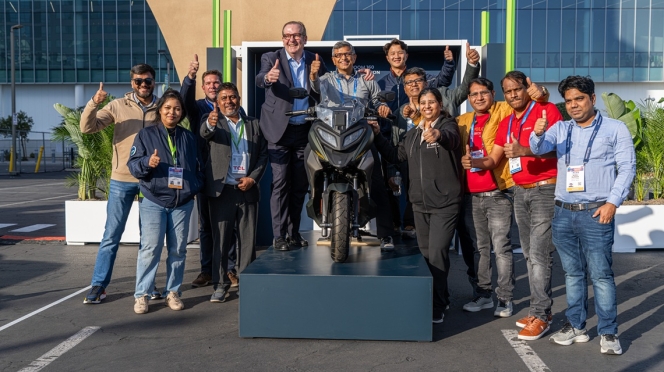
French tier 1 supplier Valeo and Hero MotoCorp, the world’s largest manufacturer of motorcycles and scooters, have inked a strategic partnership for Advanced Rider Assistance Systems (ARAS).
The partnership will focus on enhancing rider safety by introducing advanced sensing, perception and intelligent technologies tailored specifically for two-wheelers across both entry-level and premium segments, including the OEM’s emerging electric mobility portfolio under VIDA.
As part of the understanding, they will focus on ARAS by leveraging Valeo’s radar and smart camera tech equipped in Hero MotoCorp’s two-wheeler portfolio. This will not only enhance safety for two-wheeler users in India, but is also expected to drive awareness amongst customers globally.
The partners state that they have already achieved success in its proof-of-concept systems designed to protect both riders and pedestrians.
Marc Vrecko, CEO, Valeo’s Brain Division, said, “We are truly excited to partner with Hero MotoCorp to deliver solutions that will significantly enhance rider safety and create a more secure riding experience for millions of people. This collaboration is a key step in our strategy to bring advanced technology to the rapidly growing mobility market in India and globally.”
Ram Kuppuswamy, COO, Plant Operations, Hero MotoCorp, said, “At Hero MotoCorp, we are redefining the future of mobility by bringing advanced technology to our products. Our partnership with Valeo marks a significant stride in making mobility smarter, safer and more sustainable with next-gen advanced rider assistance systems. Together, we aim to make two-wheeler safety accessible to everyone and set new standards for innovation and protection globally.”
The ARAS architecture is developed as a digital co-pilot for riders, providing a 360deg safety envelope around the vehicle, it provides real-time sensing and intelligent alerts. It uses a radar-based system that can provide critical information/warnings such as Forward Collision Warning (FCW), Distance Warning (DW), Lane Change Assist (LCA), Blind Spot Detection (BSD) and Rear Collision Warning (RCW).
On the other hand, the vision system uses high-resolution cameras to provide Pedestrian Detection, Lane Detection, Traffic Sign Recognition and Lane Departure Warning.
Through intelligent image processing the system identifies road signs and obstacles, even in low-light conditions. Through the combination of radar and vision system, the two-wheeler encompasses a comprehensive safety system for two-wheeler users.
SiMa.ai And Synopsys Announce Integration To Accelerate Automotive AI Development
- By MT Bureau
- January 08, 2026
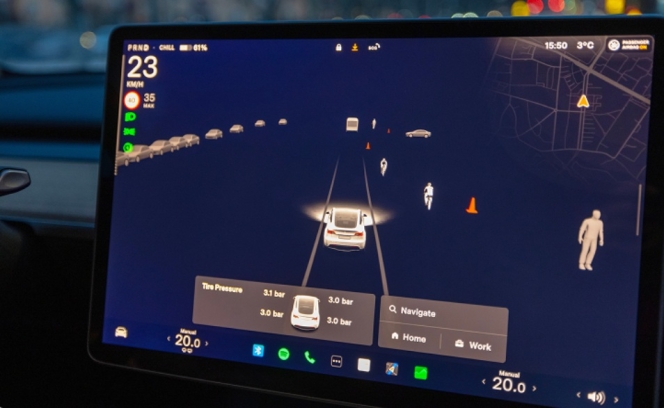
SiMa.ai has announced its first integrated capability resulting from a collaboration with Synopsys. The joint solution provides a blueprint to accelerate architecture exploration and virtual software development for automotive Systems-on-Chip (SoCs). These chips support applications including Advanced Driver Assistance Systems (ADAS) and In-Vehicle Infotainment (IVI).
The partnership aims to deliver architectures required for software-defined vehicles. The blueprint allows customers to begin the design and validation of custom AI SoCs and ‘shift left’ software development before silicon is available. This process is intended to reduce development costs and accelerate vehicle time-to-market.
The blueprint provides pre-integrated SoC virtual prototypes and a tool workflow using solutions from both companies.
For Architectural Exploration:
- SiMa.ai MLA Performance and Power Estimator (MPPE): Enables customers to size machine learning accelerator designs for specific workloads.
- Synopsys Platform Architect: Used to model workloads and analyse performance, power, memory, and interconnect trade-offs before RTL design.
For Verification and Validation:
- Synopsys Virtualiser Development Kit (VDK): Facilitates software development using a virtual SoC prototype, which can accelerate vehicle time-to-market by up to 12 months.
- SiMa.ai Palette SDK: Supports machine learning workflows for edge AI applications.
- Synopsys ZeBu Emulation: Delivers pre-silicon hardware and software validation to ensure architectures meet workload requirements.
Krishna Rangasayee, Founder & CEO at SiMa.ai, said, "We are pleased with how well the two teams have worked together to quickly create a joint solution uniquely focused on unlocking physical AI capabilities for today's software defined vehicles. Our best-in-class ML platform, combined with Synopsys' industry-leading automotive-grade IP and design automation software creates a powerful foundation for innovation across OEMs in autonomous driving and in-vehicle experiences."
Ravi Subramanian, Chief Product Management Officer, Synopsys, said, "Automotive OEMs need to deliver software-defined AI-enabled vehicles faster to market to drive differentiation, which requires early power optimisation and validation of the compute platform to reduce total cost of development and time to SOP. Our collaboration with SiMa.ai delivering an ML-enabled architecture exploration and software development blueprint supported by a comprehensive integrated suite of tools significantly jumpstarts these activities and enables our automotive customers to bring next-generation ADAS and IVI features to market faster."
Tianma Showcases Automotive Display Technologies At CES 2026
- By MT Bureau
- January 08, 2026
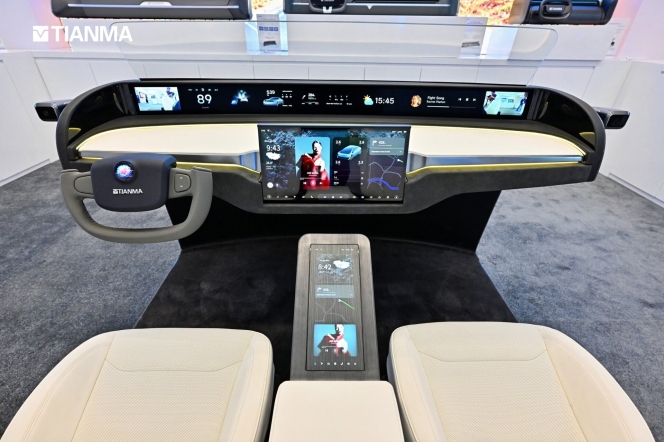
Chinese display panel manufacturer Tianma recently exhibited its range of automotive technologies at CES 2026. The company’s solutions include LTPS-LCD, AMOLED and MicroLED technologies designed for cockpits.
The centrepiece of the exhibit was the Smart Cockpit 7.0, an automotive interior and dashboard demonstration. It integrates a 49.6-inch curved ACRUS display with 8K resolution and a slidable AM-OLED display using a gear-rack mechanism.
It also presented InvisiVue, a solution that mimics decorative surfaces like wood or metal when inactive and reveals images through a transmissivity layer when powered on.
The 49.6-inch ACRUS curved display uses Corning ColdForm Technology. It features pixel-level dimming with 210,000 zones, achieving a contrast ratio of 100,000:1. The unit’s R3000 curvature is designed to align with the windshield to reduce blind spots and reflections.
Furthermore, Tianma also presented two HUD technologies – a 43.7-inch Ultra-wide IRIS HUD. It uses a Mini-LED display with peak brightness of 10,000 nits for visibility in sunlight. It features an 85 percent NTSC colour gamut and a curved structure designed to match the windshield’s optical path.
Secondly, an 11.98-inch IRIS HUD, which utilises high-luminance PGU technology, delivering 12,000 nits brightness. The module is less than 15 mm thick for integration in compact vehicles and operates at approximately 6 W to reduce thermal load.
The company also introduced a 34-inch dye liquid crystal dimming glass for rear side privacy windows. This technology uses voltage control of liquid crystal molecules to achieve stepless dimming without physical sunshades.
The system provides a response time of less than 300ms for transitions between privacy and transparent modes. It features a wide viewing angle and a grey-black tone to manage glare within the vehicle interior.



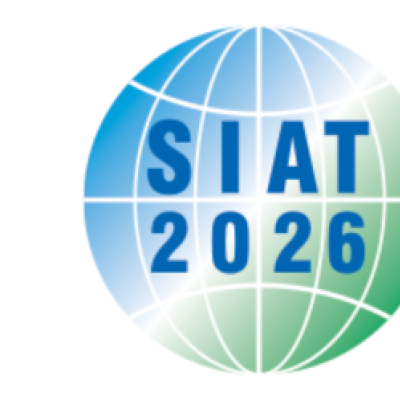



Comments (0)
ADD COMMENT